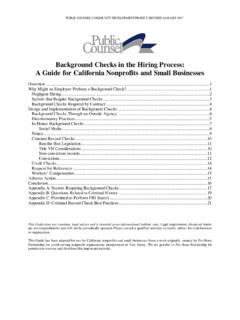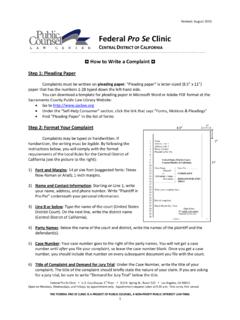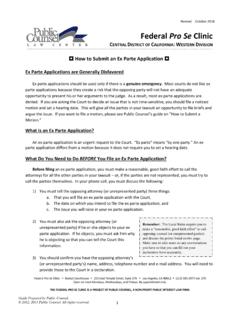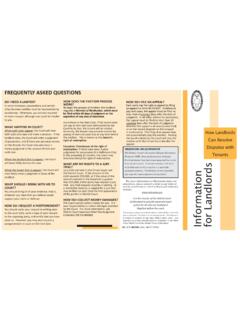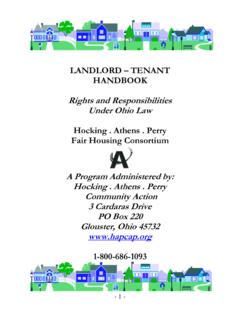Transcription of LEGAL DUTIES OF LANDLORDS TO FAMILY CHILD CARE …
1 EARLY CARE & EDUCATION LAW PROJECT. Publication Date: May 2010. LEGAL DUTIES OF LANDLORDS TO FAMILY CHILD CARE PROVIDER TENANTS. A landlord may have a difficult time understanding what it means when a tenant gives notice that they will be operating a FAMILY CHILD care home in the rental property. This handout provides answers to questions that residential LANDLORDS may have regarding a tenant operating a FAMILY CHILD care home in a rental property. Understanding LEGAL DUTIES While there may be a number of reasons that you, as a landlord , may oppose a FAMILY CHILD care home being operated in a rental property, this handout is meant to clarify that LANDLORDS may not restrict or prohibit the operation of FAMILY CHILD care homes. The following information will provide LANDLORDS with a better understanding of the LEGAL landscape related to FAMILY CHILD care homes.
2 RENTAL LEASE AGREEMENT. 1. Can a landlord include a provision in the rental lease agreement prohibiting a tenant from operating a FAMILY CHILD care home? NO. Even if a rental lease agreement states that businesses (including licensed FAMILY CHILD care homes) are not allowed in the unit, this will not prohibit a licensed CHILD care provider from operating a FAMILY CHILD care home on the premises. Under California State law, this section of the lease is treated as if it does not exist, and it will not be enforced. Therefore, a landlord cannot evict a CHILD care provider solely because they operate a FAMILY CHILD care 2. Can the operation of a FAMILY CHILD care home violate the occupancy terms in the rental lease agreement? NO. A CHILD care provider's license prohibits the provider from caring for children for 24 hours a Since the CHILD is in the home for less than 24 hours during any given day, children in FAMILY 1.
3 See California Health & Safety Code 2. See California Health & Safety Code Page 1 610 S. Ardmore Ave., Los Angeles, CA 90005 P: 213/385-2977. CHILD care homes are not considered occupants of the rental unit. Thus, the occupancy terms are not violated simply because a provider is caring for children during the day. NOTIFICATION AND PERMISSION. 1. Must a FAMILY CHILD care provider tenant give a landlord notice regarding the operation of a FAMILY CHILD care home in the rental property? YES. California State law requires existing and prospective FAMILY CHILD care providers to give their LANDLORDS a 30-day written notice of their existing or intended FAMILY CHILD care businesses. The notice3 requirements differ based on each provider's particular situation: a) If a tenant plans to open a FAMILY CHILD care home, the tenant must provide the landlord with written notice 30 days prior to opening the FAMILY CHILD care home.
4 B) If a tenant is relocating an existing FAMILY CHILD care home to another rental property, the tenant must give the landlord 30 days written notice prior to opening the FAMILY CHILD care home at the new location. 2. Is the FAMILY CHILD care provider tenant required to ask for permission to increase the number of children to be cared for? IT DEPENDS. Although State law requires that the provider give their landlord written notice, the landlord 's permission is NOT required to operate the FAMILY CHILD care home except in two specific situations mentioned There are two types of FAMILY CHILD care homes: a Small FAMILY CHILD Care Home and a Large FAMILY CHILD Care Home . A Small FAMILY CHILD Care Home is defined as a home that provides FAMILY CHILD care for up to 8 children. A Large FAMILY CHILD Care Home is defined as a home that provides FAMILY CHILD care for up to 14 children.
5 Different factors regulate the number of children that a provider can care for during a given time in a FAMILY CHILD care home. In general, California State law prevents LANDLORDS from prohibiting or restricting a provider's CHILD care operations. As stated above, while a provider must give the landlord a 30-day notice before opening the FAMILY CHILD care business, the landlord 's permission is not required. Furthermore, if a small FAMILY CHILD care provider later obtains a license to become a large FAMILY CHILD care provider, he/she is not required to ask for permission from the landlord to increase capacity to care for 12. children. However, written consent by a landlord is required when tenants who are licensed to operate: a) a small FAMILY CHILD care home decide to care for more than 6 children (and up to 8 children);. OR. b) a large FAMILY CHILD care home decide to care for more than 12 children (and up to 14.
6 Children). 3. See California Health & Safety Code 4. See California Health & Safety Code Page 2 610 S. Ardmore Ave., Los Angeles, CA 90005 P: 213/385-2977. In other words, permission from the landlord is required if a small FAMILY CHILD care licensee wants to care for 7 or 8 children or a large FAMILY CHILD care licensee wants to care for 13 or 14 children. Under such circumstances, the increase in capacity would require the landlord 's written consent. PROHIBITED ACTIONS BY LANDLORDS . 1. Can a landlord raise an individual's rent because the individual is operating a licensed FAMILY CHILD care home on the premises? NO. It is illegal for a landlord to raise the rent solely because a tenant is operating a FAMILY CHILD care home. Such increases constitute source of income discrimination and are violations of California's Fair Housing and Employment Such increases may also violate fair housing laws by creating a negative disparate impact on women and Furthermore, a landlord may not raise a provider's rent in retaliation of the provider's exercise of their LEGAL 2.
7 Can a landlord require a FAMILY CHILD care provider tenant to get liability insurance to cover the FAMILY CHILD care business? NO. California State law prohibits the imposition of any conditions on a licensee's FAMILY CHILD care business. Therefore, a landlord cannot require a provider to obtain insurance for their operations. Such a requirement is an illegal condition on a licensee's operations and cannot be enforced against the provider. California State licensing laws do not require a licensee to obtain liability insurance for their FAMILY CHILD care operation. Rather, the licensee has the choice of purchasing an insurance policy, obtaining a bond, or having the parents of the children they care for sign affidavits stating that they know the licensee does not have insurance and that the landlord 's insurance policy may not cover any accidents that might occur in the FAMILY CHILD care If you have concerns about liability issues, discuss these with the tenant .
8 You should also discuss with the tenant any hidden dangers in the property and in the common areas such as entryways and corridors that are under your control as the landlord . 3. Can a landlord impose restrictions on the hours of operation of a FAMILY CHILD care business? NO. Only California State laws can regulate a CHILD care provider's hours of operation. Any attempt by a landlord to restrict hours is an illegal, unenforceable condition. 5. California Government Code 12955. Source of income is defined as lawful, verifiable income paid directly to a tenant or paid to a representative of a tenant ; licensed FAMILY CHILD care is a lawful source of income because it is paid directly to the CHILD care provider in exchange for her care of children. 6. California Government Code 12955. 7. California Civil Code (c). 8. California Health and Safety Code Page 3 610 S.
9 Ardmore Ave., Los Angeles, CA 90005 P: 213/385-2977. 4. Can a landlord evict a CHILD care provider tenant at any time for operating a FAMILY CHILD care home? NO. A landlord must give a tenant NOTICE before asking the tenant to leave. If the tenant entered into a periodic tenancy ( a month-to-month tenancy with no specified period of duration), the landlord is required to give: a) a 60-day written notice to a tenant who has lived in the rental property for over one year; or b) a 30-day written The notice need not state a reason for the eviction. However, if the tenant signed a lease covering a term (for example, 6 months, 1 year, 5. years), the landlord cannot end the lease until the term expires unless the tenant violates a condition of the lease. Note, even if a tenant violates a condition of the lease ( failing to pay rent), a landlord must give the tenant a 3-day notice to either correct the situation or 5.
10 Can a landlord ask a tenant who runs a FAMILY CHILD care business to pay a higher security deposit? YES. A landlord may have a genuine concern that an increased number of children in the rental property will lead to more wear and tear. A landlord may therefore require the provider to pay an increased security deposit for operation of the FAMILY CHILD care business in the rental property. The increase in deposit may be required even though other tenants that do not run FAMILY CHILD care businesses pay a lesser amount. California State law provides that the maximum amount of any security deposit that can be required from a tenant is an amount equal to either: a) two months'. rent for an unfurnished property, or 2) three months' rent for a furnished A landlord cannot ask for a security deposit that exceeds these amounts. PRIVACY. 1. Can a landlord inspect a CHILD care provider's leased premises at any time?

